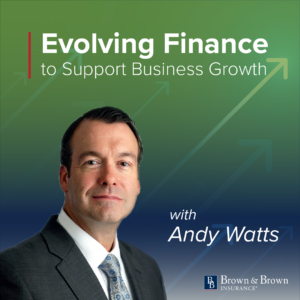Financial Literacy Series #4: Understanding What You Make and Budgeting for It
by Andy Watts, Executive Vice President & Chief Financial Officer at Brown & Brown Insurance
Building a budget and monitoring your spending is crucial to achieving your financial goals. With the holidays on our heels, having a handle on the money coming in and out is more important than ever.
Unfortunately, most Americans tend to spend more than they should — 83%, in fact. The lack of true financial literacy is a significant part of the problem. Across the globe, only one in three adults has a grasp of fundamental economic and financial principles.
But it’s possible to overcome these obstacles. The key to financial control lies in having a detailed budget that meticulously tracks your cash flow and spending. Take a moment to reflect: Are you effectively and accurately tracking your income and expenses? Are you making enough to cover all your financial commitments?
If not, this guide will help you to manage your expenses more efficiently and explore strategies to protect your income. It’s all about building a budget that works for you and investing in yourself.
Do you understand what you earn and how you earn it?
Understanding your income is the cornerstone of financial stability. From my previous articles, you now have the tools to track your expenses, but it’s equally vital to know how much money you earn and how often you earn it. Is your income fixed, such as a salary, or does it vary based on bonuses, commissions, hourly rates or tips? For those with variable compensation, it’s crucial to clearly understand how your income flows each week or month and how it aligns with your financial obligations.
Projecting how your income arrives each month and when you earn the money each week is key. Once you know when you have money coming in, you can link this with your expenses to ensure your expenditures don’t surpass your earnings.
Having a savings strategy for those months when you have more cash than your expenditures is also essential. How do you set aside money for the months when you might not have those excess funds available? How about those months when large payments are due, like insurance, school payments for your child, and property taxes? For instance, you might feel financially secure with your current balance. But remember that a substantial bill, like a $1,200 auto insurance payment due in a couple of months, requires planning and preparation.
How can you prepare for months that are up and down?
Preparing for financial ups and downs, especially for those with variable compensation, is essential to maintaining financial stability and creating long-term wealth. It’s a common pitfall for many to get caught up in the moment when income exceeds expenses. Many people will “treat” themselves to something nice as they have extra cash but do not have a plan for a time when they may be short on money due to a large expenditure. The key is to develop a proactive approach and estimate your income by month. When you find yourself earning more than you’re spending in a given month, consider setting aside some or all of the surplus in a separate account for future financial needs. This can be for various purposes, including saving for annual or quarterly bills, taxes, unexpected home repairs, or special occasions like holidays or vacations.
It’s also important to differentiate between money you save for things you want versus cash set aside for necessary expenses such as taxes and insurance. For those engaged in the gig economy who often receive lump sums of income, planning for federal and state tax obligations that might otherwise catch you off guard is particularly crucial. This financial wisdom also applies to professionals with irregular income patterns, like insurance or real estate brokers, who experience income spikes during specific months.
The solution: Schedule your year and then budget for it
To manage your finances effectively, consider implementing the following best practices.
- Have a dedicated bank account for savings only. You can start by regularly depositing a set amount, perhaps $25 or $50, into an account each month. This account serves as a financial safety net. When it’s time to make substantial payments, or you have a surprise expenditure like that annual car insurance bill or a repair for your car, you can easily access the funds. While a regular bank savings account may not yield significant interest, it offers the advantage of automated scheduling, allowing you to pre-set money transfers. This means you can allocate funds without feeling the impact on your current month’s budget.
- Schedule money to move. Consider automating your finances by setting up scheduled transfers at every paycheck, ensuring that a portion moves directly to your dedicated account. You can label this account as your “rainy-day fund” or “shortfall buffer.” For those with variable compensation, this can double as your dedicated tax account, helping you stay ahead of those obligations. Stay committed once you start the automatic payments, as it is always easy to say, “I will start next month.”
- Think forward. Identify specific times of the year when you’ll require a substantial amount, such as saving $2,500 to cover an annual renewal. Calculate how much you need to deposit into this account each month to achieve your goal. If, after building a budget, you find that your total income doesn’t match your total expenses, you’ll need to make adjustments. These adjustments might involve trimming costs or exploring avenues to increase your income. The key is maintaining financial discipline and ensuring your future financial needs are met through proactive planning and budgeting.
Reflecting on your progress
With the holidays upon us, it can put extra pressure on everyone — but finances don’t have to be one of the headaches if you’re prepared. Reflect on the key steps you’ve taken to enhance your financial well-being over the past few articles in this series. Have you taken some of the advice? How is your financial plan progressing? I’d love to hear about your experiences and insights. Financial success is a journey we are all on, and sharing our stories can be enlightening and empowering.

Evolving Finance
to Support Business Growth
with Andy Watts, Executive Vice President & Chief Financial Officer at Brown & Brown Insurance
Subscribe to Andy’s Evolving Finance monthly newsletter and view this blog on LinkedIn here.








